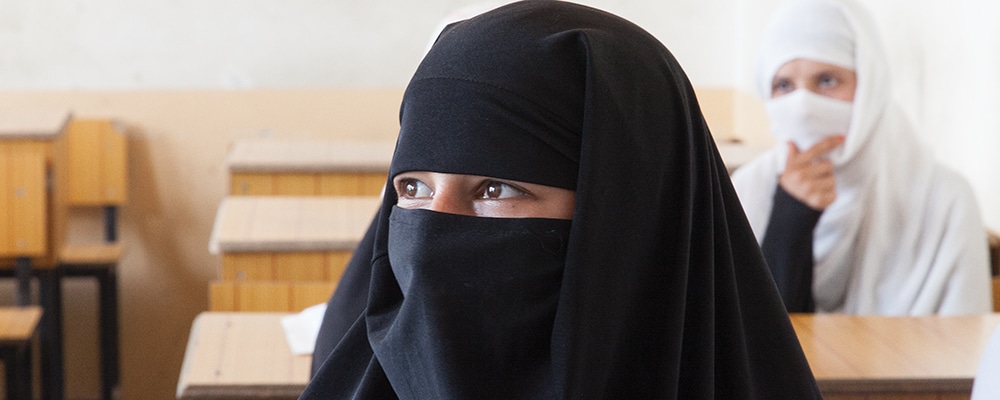Tracking Women’s Rights in Afghanistan: A Timeline
Shortly after seizing power on August 15, 2021, the Taliban announced, “We are going to allow women to study and work within our framework. Women are going to be very active in our society.”1 But over the following two years, they failed to deliver on this and numerous other promises. In fact, they proactively instituted a set of inhuman edicts to achieve the opposite—a society in which women are brutally forbidden to participate, study, and work.
While the Taliban acted with boldness and impunity, we must not assume the people were complacent or accepted these new policies. Afghanistan is a complex and diverse country, and opinions about women’s role in society vastly differ between cities and rural areas; between the country’s north, where CAI implements most of its programs, and its south, which is the Taliban’s power center; and even within communities and families.
As Central Asia Institute and our partners on the ground continue to navigate the new environment under Taliban rule, we’ve seen this struggle play out. Yes, the Taliban’s bans on secondary education for girls and university for women have forced us to narrow the scope of our programs, predominantly to focus on primary school. But we’ve also found a huge demand for our community-based classes—including for girls—in areas where there are no schools and where many adults have little to no education. And in several instances in which the Taliban sought to interfere with these classes, it was the communities themselves that fought back. Today’s Afghans are not the same as they were 20 years ago. In cities and rural areas alike, most highly value education as the best chance for a better life. Despite the challenging operating environment, we’ve continued to deliver education programs to girls, including in remote, rural areas that are culturally conservative.
The timeline below presents a snapshot of events that reflect both the Taliban’s campaign to strip Afghan women and girls of their rights to education, work, and freedom of movement, as well as big and small ways Afghans are fighting back.
AUGUST 15, 2021
Taliban fighters take control of Kabul as Afghan government officials flee amid a chaotic and deadly withdrawal and evacuation effort by U.S. forces.
SEPTEMBER 2021
- The Ministry of Education announces the opening of secondary schools for boys but makes no mention of girls.
- Dozens of girls in Paktia Province protest the Taliban’s order to close secondary schools for girls. 2
- Female government workers in Kabul are told to stay at home, except for those in jobs that could not be done by men.
DECEMBER 2021
- The Ministry of Virtue and Vice, resurrected from when the Taliban previously held power pre-2001, orders women to be accompanied by a close male relative when going out (muharram).
- Across Afghan cities, women protest, despite being threatened, intimidated, and beaten. Even though protestors are still being detained and beaten, and even disappearing, protests continue to this day.
MARCH 2022
Despite assurances that all schools would reopen for the new academic year, girls returning to secondary school are ordered to go home, and their schools are closed until further notice.
MAY 2022
- Women are ordered to wear burqas that cover them from head to toe.
- After female TV anchors are ordered to cover their faces, male TV anchors don face masks in solidarity with the #FreeHerFace campaign. 3 This follows other online campaigns by Afghan women, like #ThisIsNotMyBurqa, in which they wear traditional, colorful dress. 4
NOVEMBER 2022
Women in Kabul are banned from public parks, gyms, swimming pools, and public baths, leaving them nowhere to recreate or take their children to play.
DECEMBER 2022
Women are banned from attending university.
MARCH 2023
Female students protest outside Kabul University as their male counterparts return to classes. 5
JULY 2023
- Women’s beauty salons, one of the only remaining places for Afghan women to socialize and work, are ordered closed.
- Women in Kabul gathering to protest the closures, shouting “work, bread, and justice,” are dispersed by Taliban using water cannons and stun guns. 6
SUMMER 2023
Afghan women increasingly take their protests indoors and online, posting pictures and videos on social media to keep the world focused on their plight and allow human rights organizations to document Taliban abuses. 7
- 1 Yogita Linaye, BBC https://www.bbc.com/news/world-664617112
- 2 https://www.rferl.org/a/afghan-girls-protest-closure-secondary-schools/32027826.html
- 3 https://www.theguardian.com/global-development/2022/may/24/male-afghan-tv-presenters-
mask-up-to-support-female-colleagues-after-taliban-decree - 4 https://www.aljazeera.com/news/2021/9/16/afghanistan-women-colourful-attire-social-media
- 5 https://www.cnn.com/2023/03/06/asia/afghanistan-university-women-protest-intl-hnk/index.html
- 6 https://www.bbc.com/news/world-66244408
- 7 The group Afghan Witness has recorded 95 separate women’s protests across the country, 84 of which were held indoors, between March 1 and June 27, 2023. https://www.reuters.com/article/afghanistan-women-protests/feature-afghan-women-take-protests-online-as-taliban-crush-dissent-idUSL8N39D6VG






